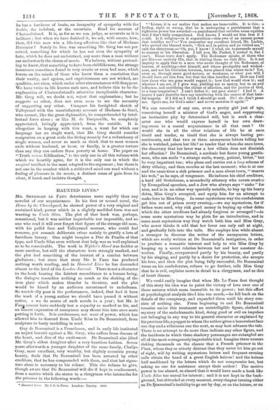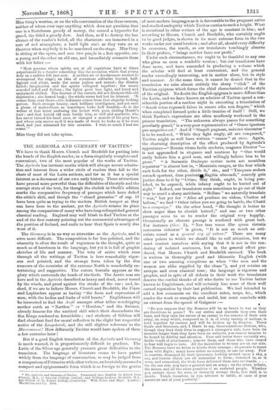HAUNTED LIVES.*
SHERIDAN LE Fu deteriorates more rapidly than any (novelist of our acquaintance. In his first or second novel, the House by the Churchyard, he showed power of a very original and sustained kind, power which in a slightly modified form was not wanting to Uncle Silas. The plot of that book was, perhaps, sensational, but it was neither improbable nor impossible, and no one who read it will ever forget that figure of the strange old man, -with his pallid face and Talleyraud manner, who could feel remorse, yet commit deliberate crime mainly to gratify a love of fastidious luxury. One might imagine a Due de Praslin of that type, and Uncle Silas even without that help was so well explained as to be conceivable. The work in 117ylder's Band was feebler or more careless, but still the characters were strongly marked, and the plot had something of the interest of a combat between gladiators ; but since that story Mr. le Fanu has produced nothing worth reading, and in Haunted Lives he has descended almost to the level of the London Journal. There is not a character in the book bearing the faintest resemblance to a human being, the dialogue resembles nothing so much as the shaking of the iron plate which makes thunder in theatres, and the plot -would be hissed by an audience accustomed to melodrama. So wretch 3dly poor is the performance, indeed, that had it been the work of a young author we should have passed it without caotice, u we do scores of such novels in a year ; but Mr. le Fang cannot have suddenly lost a capacity so marked as his, and en honest expression of annoyance may shame him into once more putting it forth. It is carelessness, not want of power, which has allowed him to descend from Uncle Silas to De Beaumirail, from aculpture to hasty modelling in mud.
Guy de Beaumirail is a Frenchman, and in early life instituted an unjust lawsuit against a Mr. Gray, who suffers from disease of the heart, and dies of the excitement. De Beaumirail also jilted Mr. Gray's eldest daughter after a very heartless fashion. Seven years afterwards a younger daughter of the same family, Challys Gray, most excellent, very wealthy, but slightly eccentric young beauty, finds that De Beaumirail has been arrested by other creditors, that he has compounded with them, and that her signa- ture alone is necessary to his release. This she refuses to give, though aware that De Beaumirail will die if kept in confinement, from a motive which she states to a clergyman who intercedes for the prisoner in the following words :— * ilaunied Lires. By J. S. to Fans. London: Tinsley. 1868. "'Listen, it is not malice that makes me immovable. It is this : a feeling, right or wrong, that he is undergoing a punishment that a righteous power has awarded—a punishment that satisfies some equities that I don't fully comprehend. God knows I would set him free if I could. Is it religion—is it superstition—this awe of an unseen power that terrifies me ?'—' You remember my excellent friend, Mr. Larkin, who quoted the blessed words, "Sick and in prison and ye visited me," said the clergyman.--' Oh, yes, I know ! I tried, sir, to persuade myself to consent to his liberation. I tell you, Mr. Parker, I wished it, but I can't. Those texts don't apply. The Redeemer speaks of those who are His—so entirely His, that in visiting them we visit Bin. Is it not impiety to apply that to a man who never thought of his Redeemer, of heaven, of anything—but himself, and whose prodigality and wicked- ness, and not his Christian heroism, have placed him where he is ? Yet, even so, through mere good-nature, or weakness, or what you will, I should have set him free, but that the idea terrifies me. How can I tell how those who are gone would regard it ; how God would view it ; and whether I am not, if I give way, yielding not to mercy, but to an evil influence, and sacrificing the claims of affection, and the justice of God, to a base temptation? I can't define it : my poor sister ! I feel it. A horror I can't describe bars my interfering with the course of that hate- ful tragedy. If I did so I think I should go mad. Oh! sir, don't press me. Spare me, for God's sake ! and never mention it again.'"
We can conceive of any one, even a pretty girl just of age, conceiving herself a minister of God's anger, and suppressing
an instinctive pity by determined will, but is such a char- acter one who would express herself in her own draw- ing-room to a casual acquaintance in all that rant ? Or
would she in all the other relations of life be at once timid and tender, so timid that she is always having pre- sentiments, and that two or three anonymous letters telling her she is watched, poison her life? so tender that when she once loves, the discovery that her lover was a low villain does not diminish
her affection? Be Beaumirail, a sardonic but fierce young gentle- man, who can smile " a strange smile, weary, patient, bitter," but be very impatient too; who plans and carries out a long scheme of dirty villainy, and then recedes at the last moment; who is at one and the same time a sick prisoner and a man about town, "weaves his web," as he says, of vengeance. He induces his chief creditors,
a hard old Scotchman, a scoundrelly attorney who covers avarice by Evangelical speeches, and a Jew who always says " nishe " for nice, and is in no other way specially notable, to buy up his heavy debts, Miss Gray's excepted, and equip him for an attempt to make love to Miss Gray. In some mysterious way the confederates get him out of prison every evening,—we say mysterious, for if bribes were used, why risk good money in buying up other debts which the other creditors had already forgiven or arranged ?—in some more mysterious way he plots for an introduction, and in some most mysterious way they watch both him and Miss Gray, who never thinks it odd that her lover can only call at night, and gradually falls into the toils. She employs him while almost a stranger to discover the writer of the anonymous letters, which are really written at Be Beaumirail's instigation, in order to produce a romantic interest and help to win Miss Gray by keeping up a secret relation between her and her amateur de- tective. Finally, overpowered partly by his beauty, and partly by his singing, and partly by a desire for protection, she accepts his love, and then the plot being fully successful, Be Beaumirail turns on his confederates, refuses to go further, tells Miss Gray
that he is evil, explains more in detail to a clergyman, and so dies of heart disease.
We could easily imagine that when Mr. Le Farm first thought of this story his idea was to paint the victory of love over one of those natures which seem insensible to its power ; but this effort at psychological analysis tired him too much,—he fell back on the
details of the conspiracy, and expanded them until his story con- sists of nothing else. From beginning to end Be Beaumirail remains under this treatment an unintelligible figure, clothed in mystery of the melodramatic kind, doing good or evil on impulses not belonging in any way to his general character or explained by his previous life, a puppet to whom the author gives a benevolent face one day and a villainous one the next, as may best advance the tale. There is no attempt to do more than indicate any other figure, and the incidents in which these shadowy personages are entangled are all of the most outrageously improbable kind. Imagine three usurers risking thousands on the chance that a French prisoner in the Fleet, whom they so utterly distrust that they never let him go out of sight, will by writing mysterious letters and frequent evening calls obtain the hand of a great English heiress! and the heiress half maddened by the letters which do not compromise her, but asking no one for assistance except their author I The motive
power is too absurd, so absurd that it would have made a book like Uncle Silas too unreal for interest ; and it is not kept in the back- ground, but obtruded at every moment, every chapter turning either on De 4eaumirairs inabilityto go out by day, or on the letters, or on
Miss Gray's worries, or on the vile conversation of the three usurers, neither of whom ever says anything which does not proclaim that one is a Scotchman greedy of money, the second a hypocrite for greed, the third a greedy Jew. And then, as if t) destroy the last chance of the reader's belief, all the characters are immersed in a sort of red atmosphere, a lurid light such as they turn on at theatres when anybody is to be murdered on the stage. Miss Gray is sitting at the opera, and sees two people in a box opposite, one a young and the other an old one, and immediately connects them with her letter :—
" Most persons whose spirits are at all capricious have at times experienced in a theatre something like the sensation which that young lady on a sudden felt just now. A sudden air of desolateness seemed to overspread the stage ; an idea of cavernous solitudes beyond, half- lighted and silent., made the scene joyless and unreal ; the illusion failed ; imagination and the spirits collapsed together ; the music sounded jaded and forlorn ; the lights grow less light, and fancy and enjoyment chilled. The descent of the curtain did not dissipate this odd depression ; she leaned back; the whole scene had lost its interest. 'It comes from over there—this influence comes from that singular-looking person. Such strange beauty, such brilliant intelligence, and yet such a gleam of malevolence as sometimes looks half fiendish—he is the writer of that letter enclosing the locket with poor, darling Ifaude's hair ; and that horrid old man beside him, so stiff and apathetic, who has never turned his head once, or changed a muscle of his gray face, and whose arm moves as if it was made of wood, he looks as if he were dead, and just animated for this occasion. I wish so much I had not
come.'" Miss Gray did not take opium.































 Previous page
Previous page